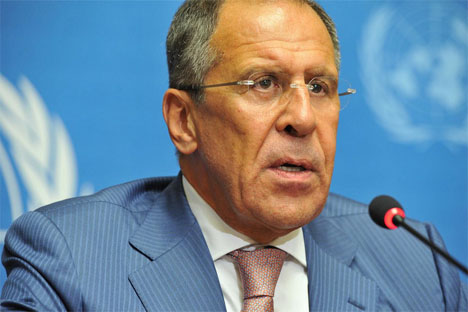
Russian Foreign Minister Sergei Lavrov: "A realistic assessment of the situation in Syria should encourage sensible opposition members to look for ways to start political dialog." Source: flickr / United Nations - Geneva
Russia will stick to its current position on Syria and keep opposing any attempts to justify foreign intervention in the Middle East countries, Russian Foreign Minister Sergei Lavrov said in a recent interview to Interfax.
"We will continue to oppose attempts to legitimize change of regime operations under the flag of 'responsibility for protection,' and to advocate the solution of problems by politico-diplomatic methods with respect for the sovereignty, territorial integrity and equality of all nations,” he said.
"We understand that the soonest ceasefire for the sake of saving lives of Syrian civilians is the primary objective," he stated at today's press conference following negotiations with his Egyptian counterpart Mohamed Kamel Amr. At the same Lavrov reiterated Moscow’s readiness to negotiate with Syria's opposition coalition.
"We have already contacted the coalition's leadership through our embassy in Cairo,” he said. “We announced our readiness to meet with the chairman, Mr. Khatib. We are still ready to do so." “In my opinion, a realistic assessment of the situation in Syria should encourage sensible opposition members to look for ways to start political dialog," he added.
According to Lavrov, the political dialog is possible if both the Syrian opposition and the government try to come up with a compromise.
In his previous interview to Russia Today Lavrov also warned against using chemical weapons that would be political suicide for Syria’s government. He didn’t rule out foreign military intervention in Syria — and said this could follow the scenario of Iraq or former Yugoslavia.
“I don’t believe Syria would use chemical weapons,” he said. “It would be political suicide for the government if it does. Every time we hear rumors, or pieces of information come to surface that the Syrians are doing something with the chemical weapons, we double-check, we triple-check, we go directly to the government [of Syria] - and each time we get very firm assurances that they will not be used under any circumstances.”
Russia ready to meet with Syrian National Coalition leader - Lavrov
Moscow does not reject dialogue with Syria's opposition National Coalition
Syrian delegation visiting Russia to negotiate with Russian Foreign Ministry on Syrian conflict
When asked whether he thought military action could still take place, skirting around the UN as happened in the case of Iraq, Lavrov said: “Yes, it is possible,” adding “and not only in the case of Iraq - but also in the case of former Yugoslavia.”
At the same time, Lavrov gave assurances that Russia wasn’t going to convince the Syrian president Bashar al-Assad to step down, because “we don't do regime change”. The Foreign Minister recalled that Assad had announced many times that he was not going to leave his post.
The UN and Arab league envoy Lakhdar Brahimi have been discussing with the Syrian leadership a “road map” to settle the conflict based on the Geneva Communiqué approved at a June 30 meeting of the “Action Group”. This plan is known as “Geneva-2” at the Arab League.
However, it depends largely on the agreement of the ruling regime and the opposition to make a historic compromise for the sake of stopping the bloodshed. The Geneva Communiqué envisages a transitional government for Syria, recruited from the ranks of the regime and the opposition to oversee new parliamentary and presidential elections.
Riots that broke out in Syria in March 2011 later turned into fighting between opposition forces and government troops. The Syrian government maintains that the rebel forces active in the country are receiving support from abroad. According to different UN estimates, between 20,000 and 30,000 people have been killed in the hostilities, RIA Novosti reported.
The article is a combined report based on materials from Interfax, the Vzglyad newspaper and RIA Novosti.
All rights reserved by Rossiyskaya Gazeta.
Subscribe
to our newsletter!
Get the week's best stories straight to your inbox